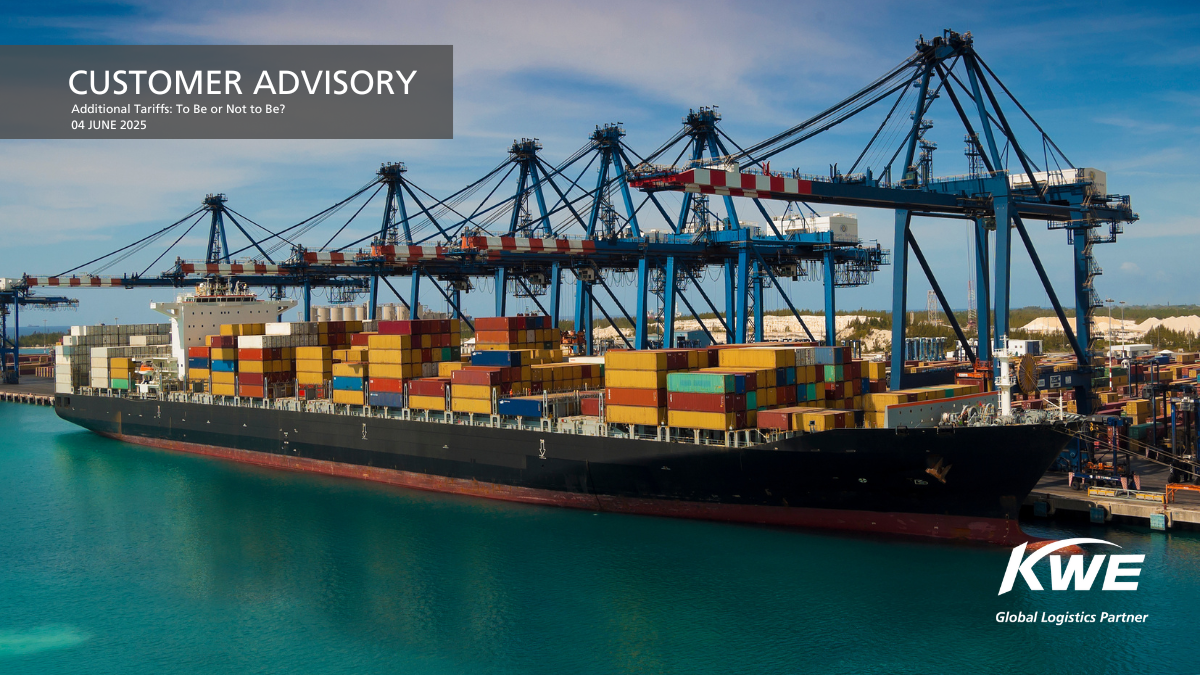Quote
Customer Advisory: Additional Tariffs: To Be or Not to Be? More Announced!

U.S. President Donald Trump announced at a rally at U.S. Steel Corp. that he would be increasing tariffs on steel from the current 25% to 50%. On June 3, 2025, President Trump issued a proclamation on this increase under Section 232 and also raised aluminum tariffs from 25% to 50%, effective June 4, 2025. The United Kingdom has been exempted from this increase. Specific reporting instructions for steel and steel derivatives have been detailed by U.S. Customs and Border Protection (CBP) on Cargo Systems Messaging Service (CSMS) #65236374, and for aluminum and aluminum derivatives on CSMS #65236645.
Late on Friday, May 30, 2025, U.S. Customs and Border Protection (CBP) announced a new end date for the in-transit provision extension: June 16, 2025, via CSMS #65201773. This guidance is temporary, as explained in the CSMS message, while the stay of the U.S. Court of International Trade (CIT) judgment is in effect. CBP continues to face the difficult task of implementing tariffs while being sidelined from procedural enforcement. Importers continue to face a tight timeline, with ambiguity surrounding whether goods must be shipped or must arrive in the U.S. by these dates—adding to the pressure.
Following the decision by the U.S. Court of International Trade (CIT) last week, which held that the International Emergency Economic Powers Act (IEEPA) tariffs were unlawful and needed to be revoked, the government filed an appeal with the Court of Appeals for the Federal Circuit (CAFC), along with a request to stay the CIT’s order. This stay has been granted for a period of seven days.
In further related developments, the District Court opined that the IEEPA tariffs were not within the purview of the CIT and that it therefore lacked authority to decide the case. The court granted an injunction only to the two plaintiffs before it. Based on these developments, legal advisers, trade associations, and customs brokers have analyzed and opined that importers must continue paying the existing tariffs. Importers should track and record all IEEPA Fentanyl and IEEPA Reciprocal duties paid since February 4 and April 5 in order to file for a refund—hopefully—through the PSC or protest process.
Therefore, we advise our readers to remain hopeful for a positive outcome, and to be organized and prepared with lists, entry data, and physical import records, as full or partial refunds may be forthcoming.
The 90-day pause announced on April 9 is now halfway through, with May 28 marking the midpoint for 57 trading partners. The deadline for the paused tariffs is July 7, while for China it extends to August 14. Despite the pause, trade agreements remain elusive. Only the United Kingdom has reached a “draft trade agreement” with the United States, yet a 10% base tariff persists. Talks with the European Union, South Korea, and Japan are stalled, largely due to the United States’ insistence on maintaining a 25% tariff on automobiles. Meanwhile, South Korea has stated that it will respond to the 50% steel tariff. China demands that the U.S. correct what it calls “false unilateral tariffs” to enable genuine negotiations. According to The New York Times, the European Union plans to “accelerate” talks after initially delaying a 50% tariff. Japan is processing the announced increase on steel tariffs with its own countermeasures and plans to assist the U.S. in developing President Trump’s proposed “Golden Dome.” India plans to impose retaliatory tariffs, as its WTO notice was ignored. Canada deems the tariffs “unjustified,” requiring changes under the United States–Mexico–Canada Agreement (USMCA), but has exempted almost all of its retaliatory tariffs. Spain has labeled them a “unilateral attack,” but is preparing its pharmaceutical industry. Germany predicts “losses for all,” while calling for increased competitiveness. Australia is refraining from retaliatory tariffs and has proposed a five-point plan to counter the effects. Japan has expressed “grave concern,” seeking reduced automotive tariffs along with broader measures to protect affected industries. Mexico has not imposed additional tariffs and instead highlights a “good relationship,” approaching the situation with calm and strategic patience.
On May 31, 2025, the Office of the U.S. Trade Representative (USTR) announced the extension of current exclusions for the China Section 301 duties that were scheduled to expire on May 31, 2025. This includes 164 exclusions that were extended on May 30, 2024, and 14 exclusions covering certain solar manufacturing equipment announced on September 14, 2024. These exclusions have now been extended to August 31, 2025, per Federal Register Notice Extending Exclusions 05312025.pdf.
Informational document brought to you by KWE-USA Corporate Compliance